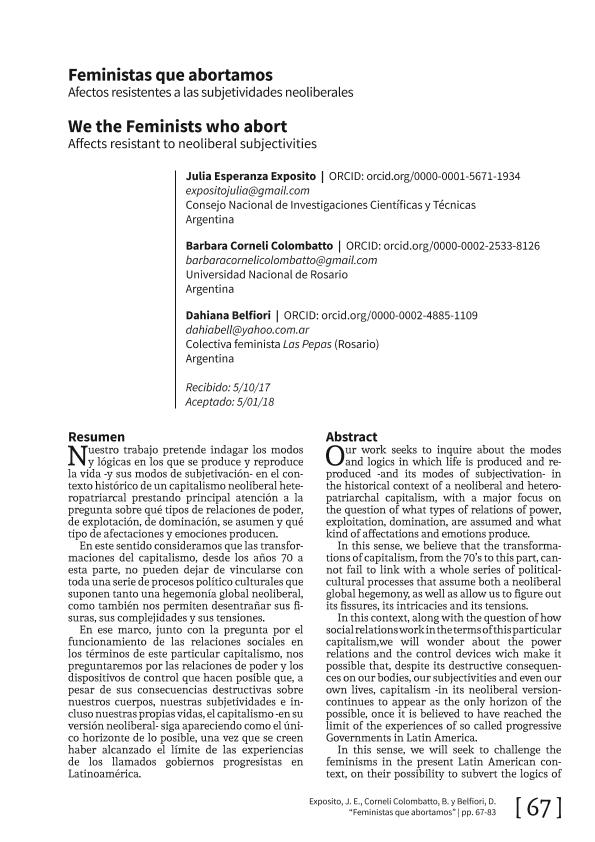Artículo
Nuestro trabajo pretende indagar los modos y lógicas en los que se produce y reproduce la vida -y sus modos de subjetivación- en el con-texto histórico de un capitalismo neoliberal hete-ropatriarcal prestando principal atención a la pregunta sobre qué tipos de relaciones de poder, de explotación, de dominación, se asumen y qué tipo de afectaciones y emociones producen.En este sentido consideramos que las transfor-maciones del capitalismo, desde los años 70 a esta parte, no pueden dejar de vincularse con toda una serie de procesos político culturales que suponen tanto una hegemonía global neoliberal, como también nos permiten desentrañar sus fi-suras, sus complejidades y sus tensiones.En ese marco, junto con la pregunta por el funcionamiento de las relaciones sociales en los términos de este particular capitalismo, nos preguntaremos por las relaciones de poder y los dispositivos de control que hacen posible que, a pesar de sus consecuencias destructivas sobre nuestros cuerpos, nuestras subjetividades e incluso nuestras propias vidas, el capitalismo -en su versión neoliberal- siga apareciendo como el único horizonte de lo posible, una vez que se creen haber alcanzado el límite de las experiencias de los llamados gobiernos progresistas en Latinoamérica. Our work seeks to inquire about the modes and logics in which life is produced and reproduced -and its modes of subjectivation- in the historical context of a neoliberal and heteropatriarchal capitalism, with a major focus on the question of what types of relations of power, exploitation, domination, are assumed and what kind of affectations and emotions produce. In this sense, we believe that the transformations of capitalism, from the 70’s to this part, cannot fail to link with a whole series of politicalcultural processes that assume both a neoliberal global hegemony, as well as allow us to figure out its fissures, its intricacies and its tensions. In this context, along with the question of how social relations work in the terms of this particular capitalism,we will wonder about the power relations and the control devices wich make it possible that, despite its destructive consequences on our bodies, our subjectivities and even our own lives, capitalism -in its neoliberal versioncontinues to appear as the only horizon of the possible, once it is believed to have reached the limit of the experiences of so called progressive Governments in Latin America. In this sense, we will seek to challenge the feminisms in the present Latin American context, on their possibility to subvert the logics of hegemonic subjectivation and to exhibit the expropriation of the common from the neoliberal and heteropatriarchal plots, building new forms of political, sensitive and affective linkages. In particular, we will focus our analysis on the experience of Socorristas en Red (Feministas que abortamos), as a form of organization and feminist activism that, while puts hegemonic logic in tension, is not exempt from the contradictions that this stage enables.
Feministas que abortamos : afectos resistentes a las subjetividades neoliberales
Fecha de publicación:
09/2018
Editorial:
Universidad Nacional de San Juan. Facultad de Ciencias Sociales. Instituto de Investigaciones Socioeconómicas
Revista:
RevIISE
ISSN:
2250-5555
Idioma:
Español
Tipo de recurso:
Artículo publicado
Clasificación temática:
Resumen
Palabras clave:
NEOLIBERALISMO
,
ABORTO
,
FEMINISMO
,
POLITICA
Archivos asociados
Licencia
Identificadores
Colecciones
Articulos(CCT - ROSARIO)
Articulos de CTRO.CIENTIFICO TECNOL.CONICET - ROSARIO
Articulos de CTRO.CIENTIFICO TECNOL.CONICET - ROSARIO
Citación
Exposito, Julia Esperanza; Cornelo Barbara ; Belfiori Dahiana; Feministas que abortamos : afectos resistentes a las subjetividades neoliberales; Universidad Nacional de San Juan. Facultad de Ciencias Sociales. Instituto de Investigaciones Socioeconómicas; RevIISE; 11; 9-2018; 67-83
Compartir




